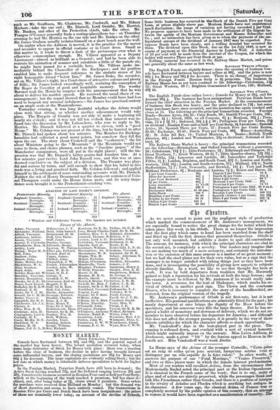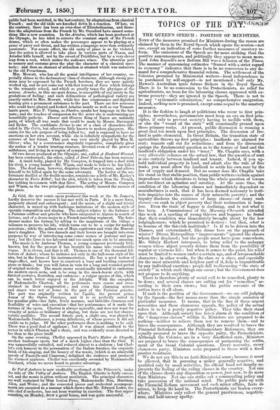La Harpe says of the Aridne of the younger Corneille,
" Cette pike eat au rang de cellos qu'on joue souvent, lorsqu'une actrice veut se distinguer par im rale capable de in faire valoir." In other words, it answers the purpose of our "Fatal Mariiage " "Venice Preserved," and two or three pieces more in which the female interest predominates. Most of our readers will recollect ..dricine from the circumstance that Mademoiselle Rachel acted the principal part at the Italian Operahouse. It is classical in the French sense of the word ; that is to say, unity of place and of action are strictly preserved, while the personages think and talk like Frenchmen rather than Greeks, and there is a position of intrigue in the rivalry of Ariadne and Phredra which is anything but antique in its character. A few years ago, the classical drama of France was so completely scouted by the public opinion of this country, that an attempt to restore it would have been regarded as a manifestation of insanity. The public had been surfeited, in the last century, by adaptations from classical French ; and the old idols are knocked down in a reaction. Of late, on the contrary, there has been an over-dose of Flizabethanism, and there- fore the adaptations from the French by Mr. Oxenford have caused some- thing like a new sensation. In the Ariadne, which has been produced at the Olympic, he has tried to remove the constant esprit of the French drama, which so often makes the personages appear to be playing at a game of parry and thrust, and has written a language more than ordinarily passionate. For scenic effect, the old unity of place is so far violated, that the action is allowed to take place in various parts of Naxos, and Ariadne kills herself, not by the sword of Peirithaus, but by a very clever leap from a rock, which makes the audience wince. The attention paid to scenery and costume gives the play the character of a classical spec- tacle • and thus an element of attraction is attained which was unknown to the old Frenchman.
Mrs. Mowatt, who has all the genial intelligence of her country, es- pecially shines in the declamatory class of character. Although strong pas- sions may be expressed by the French heroines, they are more quietly worked up, and do not come out with that torrent of force which belongs to the romantic school, and which so greatly taxes the physique of the actress. 21riadne, in this one-part drama, is susceptible of any nicety in the gradations of feeling: and such delineations of pathological vanety are -exactly suited to Mrs. Mowatt, while her fine countenance and dignified bearing give a permanent substance to the part. There are few actresses who could have played and looked Aria' due nearly so well as our Transat- lantic guest. Miss F. Vining, as Bicedra, speaks her language in the best taste; and the touches of compassion for the sister she is undermining are beautifully pathetic. Theseus and (Enema King of Naxos are unkindly parts, of which all was made that could be made by Messrs. Davenport and Ryder. The confidante Nerina is one of a class of characters ridi- culed in The Critic, but otherwise little known to modern playgoers. She exists for the sole purpose of being talked to; and is supposed to have no emotions on her own account, while she is infinitely sympathetic for the sorrows of her friend. This part was very nicely played by Miss M. Oliver ; who, by a countenance singularly expressive, completely gives the notion of a tender trusting creature, divested even of the power of selfishness, and living in a reon of sympathy. Of two farces produced at the Olympic, one, called 21 Husband ranted, 13119 been condemned; the other, called A Dead Take-in, has been success- ful. A timid bully, played by Mr. Compton, is trapped into a duel with his rival, a young hussar—Mr. Wigan, and made to believe he has killed him. The dead man, however, disguises himself as a notary, and allows himself to be killed again by the seine adversary. The horror of the un- Tortunate duellist at the double murder, reminds one a little of Mr. Keeley's character in Twice Kilkd ; but the plot, which is taken from the French, has nothing in common with that farce. The acting of Messrs. Compton and Wigan, as the two principal characters, chiefly insured the success of the piece.



























 Previous page
Previous page